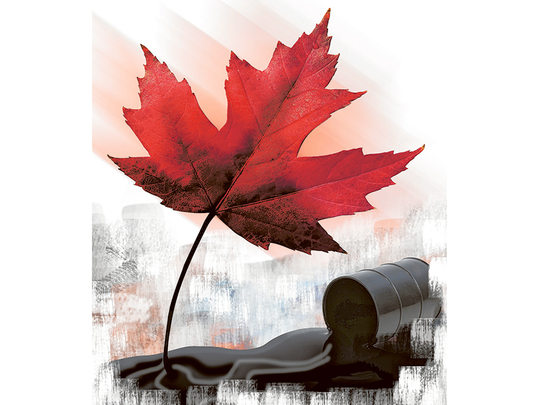
I’m a big fan of Canada. With its strong public institutions, optimal immigration policy and endowments of natural resources, it seems to have everything necessary to become a great power someday.
But in recent years, I did worry that Canada would make a big strategic mistake: depending too much on resource extraction.
After becoming prime minister in 2006, Stephen Harper was eager to develop Canada’s tar sands into a powerful oil export industry. His government helped the oil industry with outreach and advertising, gave it subsidies and proposed large infrastructure projects to help it move its product.
Between that effort, improved extraction technology and high oil prices, Canada became a petroleum powerhouse. The tar sands have doubled production during the past two decades, shows research from James Hamilton, a highly respected economist at the University of California San Diego who studies the oil industry.
That’s been good for Canada’s economy in the short run. But over time, it risks turning Canada into the kind of economy that no one should aspire to be — a petro-state.
Petro-states, which depend on oil for large percentages of their exports, are a notoriously dysfunctional bunch of countries. A few, such as Norway, Qatar and Kuwait, are rich. Most, like Nigeria, Russia and Iran, are much less so.
Norway is the only liberal democracy I can think of among petro-states. And all of them are very susceptible to oil price shocks.
The problem with the petro-state economy is basically one of diversification. You wouldn’t put half of your wealth into a bet on the price of a single commodity, would you? Well, that is effectively what petro-states do.
That means when the price of oil goes down, their growth craters. Petro-states like Russia and Nigeria have struggled to grow since oil prices crashed, and better-managed countries like Norway might not be far behind.
Of course, becoming a petro-state isn’t entirely intentional; if you have large oil deposits, then choosing not to dig them up equals leaving money on the table. But when you export your oil, you tend to get what’s known as Dutch disease — your currency goes up in value, which makes it hard to export anything other than oil.
In classical economics — for example, the simple trade models of David Ricardo, taught to every Econ 101 student — specialising in oil is no better or worse than specialising in software, auto manufacturing or finance. But some development economists believe that a country’s position in the network of global value chains is crucial to its wealth.
Physicist Cesar Hidalgo and economist Ricardo Hausmann formulated this theory back in 2008. One of its implications is that when you get stuck specialising in a simple product like oil, it’s very hard to climb the value chain to other products.
Canada, fortunately, is already a rich country with good technological capabilities and lots of human capital. In this respect it resembles Norway. But if it becomes too reliant on oil for too long, there’s a chance it could lose its edge in industries like high-tech manufacturing and software.
It would be pretty bad if all of Canada’s tech sector were to go the way of companies like Nortel and BlackBerry.
Changing technology is creating a third huge long-term risk for petro-states. As the world shifts to electric cars, oil may become a niche product instead of the lifeblood of the global economy. In that case, oil prices won’t just go down for a decade or two — they’ll stay low forever.
The electric age will leave former petro-states impoverished unless they can retool their economies dramatically.
Canadian thinkers are hardly oblivious to this danger. The think tank Policy Horizons Canada recently released a report warning about the danger of over-reliance on the oil industry in an age of renewable energy.
But what can Canada do to avoid going down a dead-end development path? The obvious move is to cut subsidies to the oil industry, including public-relations support. A more controversial move would be to scale back big oil-centric infrastructure projects.
These are risky moves, because they represent bets on the future of technology and markets — what some people pejoratively refer to as “picking winners”. If oil prices go back up, Canada would lose out.
But to some degree, picking winners is unavoidable — every government dollar not spent on oil infrastructure could be spent on something else, or returned to taxpayers.
Oil is an obvious, easy bet for a country to make. But it’s a very risky one, especially in the long term. Avoiding the petro-state trap would probably be Canada’s wisest move.
— Washington Post
The writer is an assistant professor of finance at Stony Brook University.












